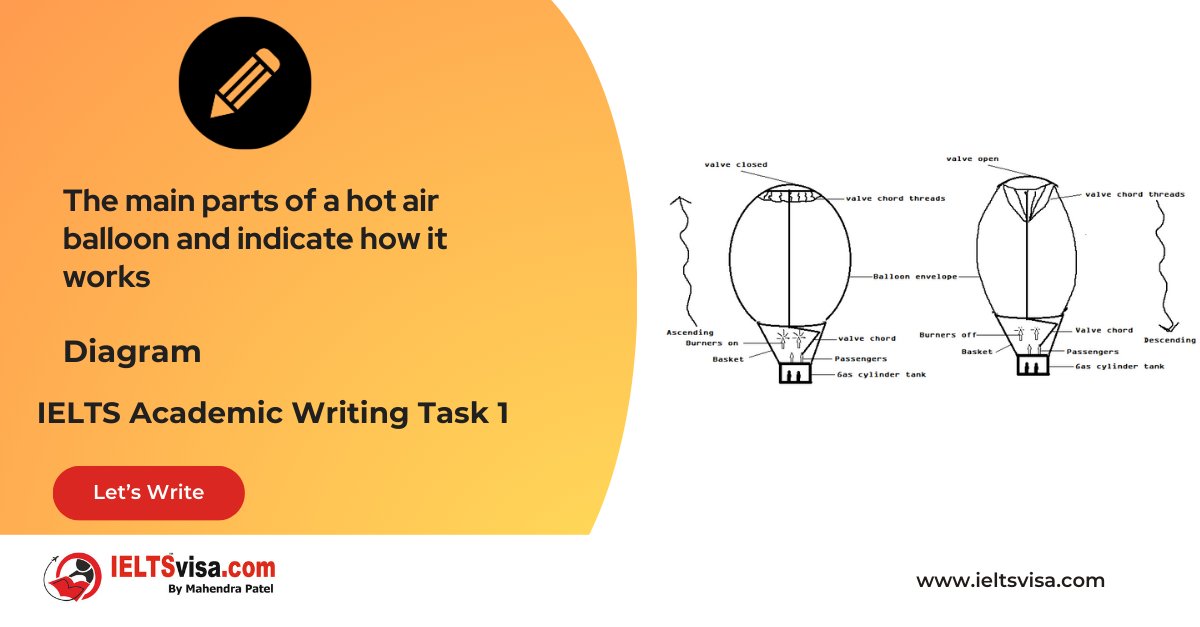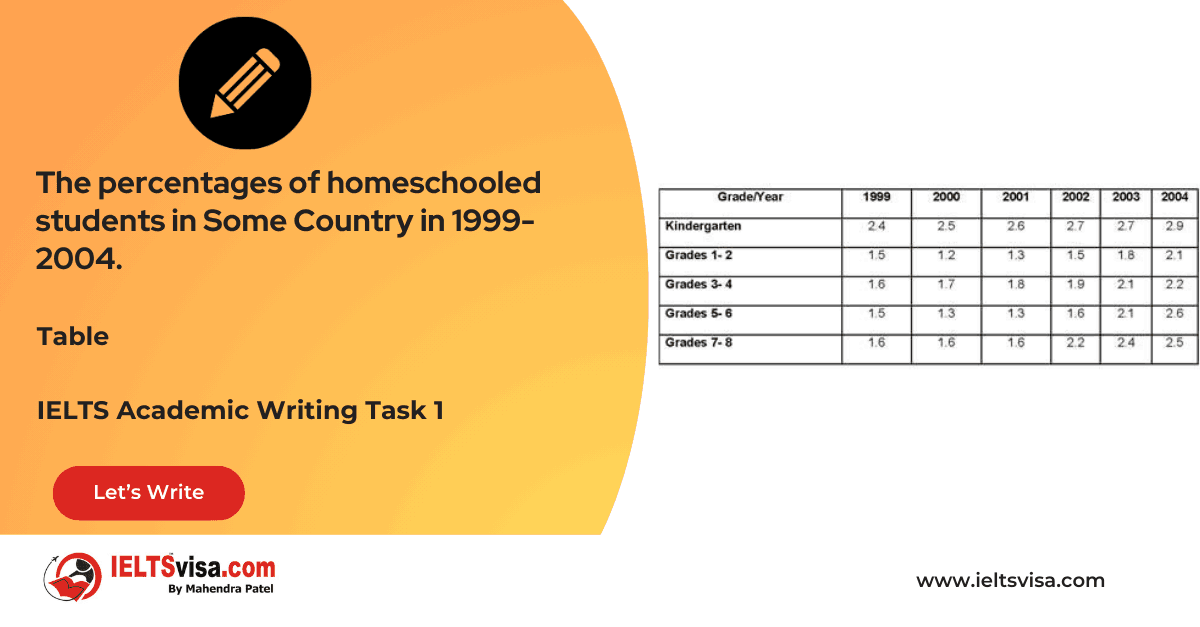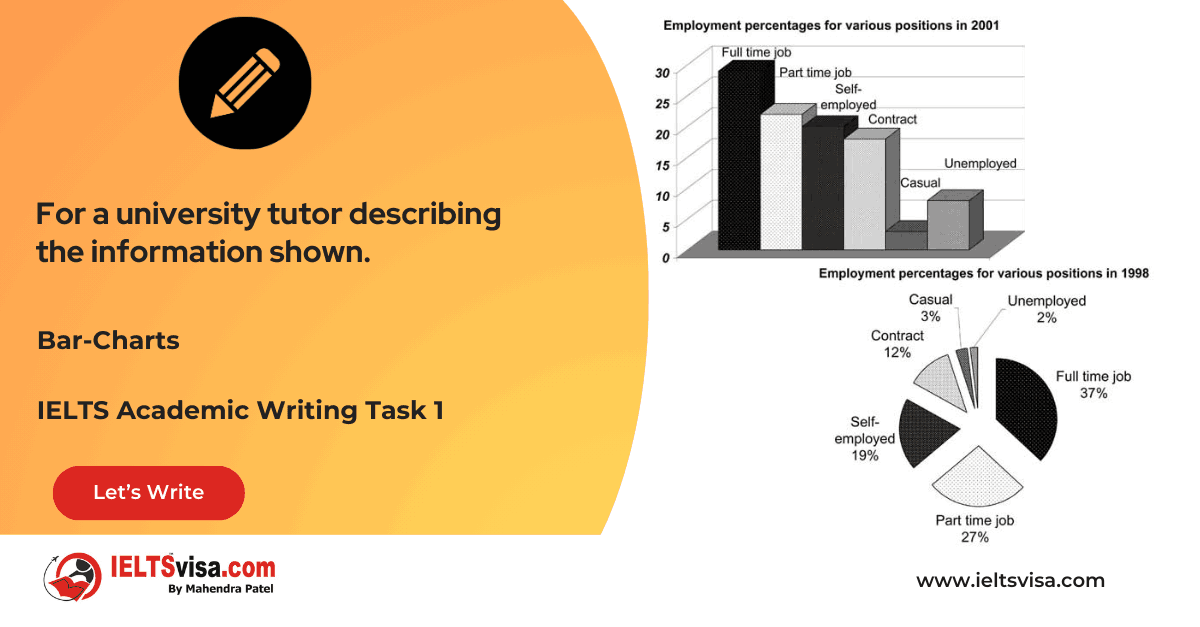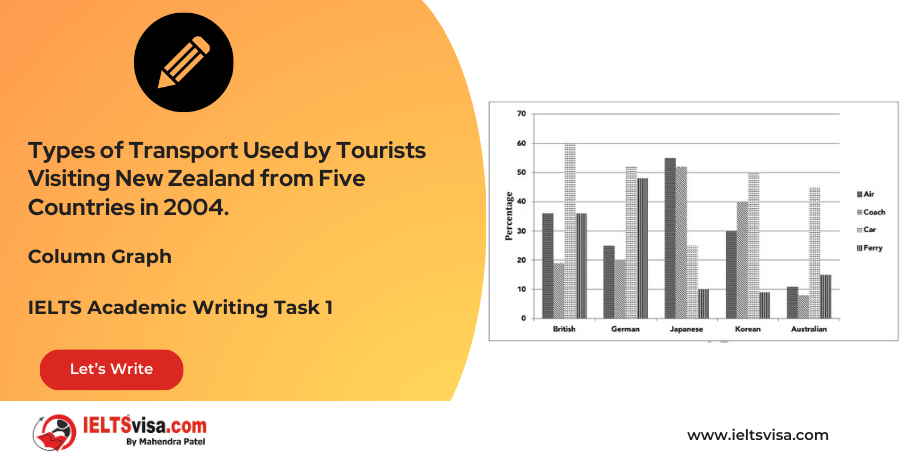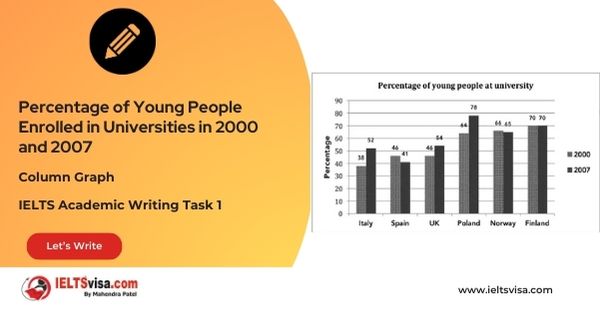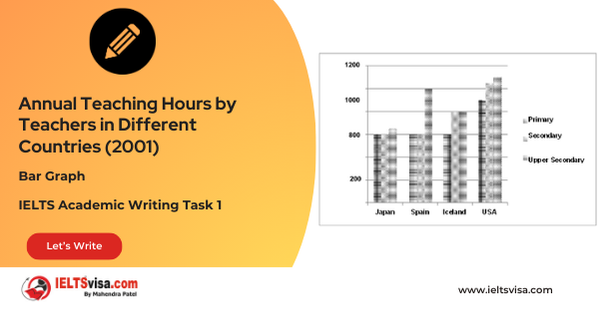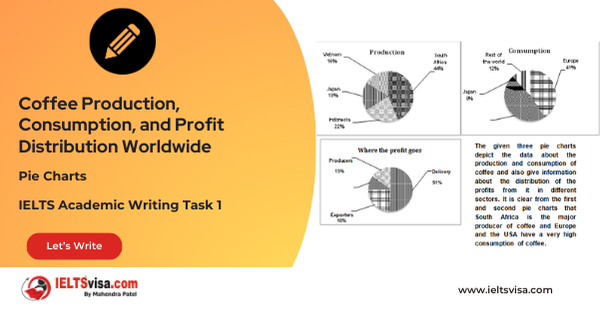Omission/Incorrect Inclusion of Articles
Lexical Resource & Grammatical Range and AccuracyIELTS Academic Writing Task 1
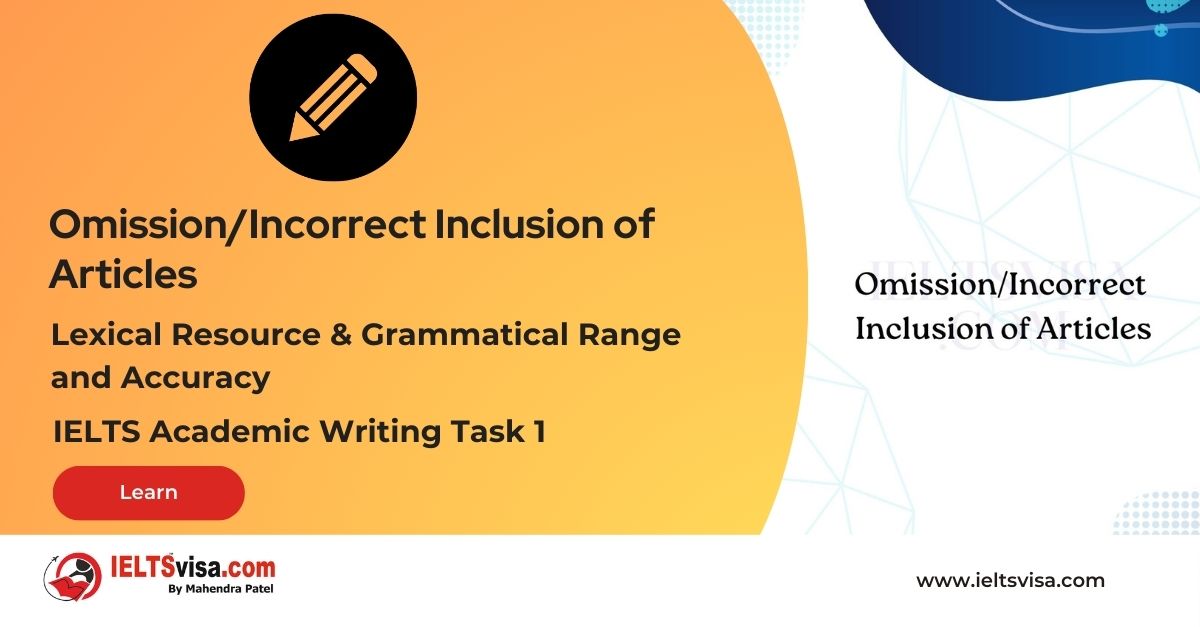
In the IELTS Academic Writing Task 1, demonstrating strong Lexical Resource and Grammatical Range and Accuracy is crucial for achieving a high score.
One of the common errors to avoid is the omission or incorrect inclusion of articles (a, an, the).
Articles are vital in English grammar, providing specificity and clarity to the nouns they modify.
In this article, we will explore the importance of using articles correctly in Task 1, accompanied by examples and answers to help you identify and rectify this issue effectively.
1. Omission of Articles:
Omitting articles can lead to confusion or make your writing sound unnatural. Including the appropriate article to specify the noun or noun phrase is essential.
Example:
Original Sentence:
Student prepared for exam.
Revised Sentence:
The student prepared for the exam.
In the revised Sentence, the indefinite article “a/an” is added before the noun “student” to indicate that it refers to a general student. The definite article “the” is also used before the noun “exam” to specify a particular exam.
2. Incorrect Inclusion of Articles:
Using the wrong article or including articles where they are not needed can affect the meaning or clarity of your writing. It is essential to understand the rules governing the use of articles in English.
Example:
Original Sentence:
I want to go to the university.
Revised Sentence:
I want to go to university.
In the revised Sentence, the definite article “the” is removed before the noun “university” because, in general contexts, we do not use an article when referring to university as a concept or institution.
Omission of Articles with Plural and Uncountable Nouns:
Sometimes, articles are not required before plural or uncountable nouns. Omitting articles in such cases can make your writing more concise and natural.
Example:
Original Sentence:
She loves to listen to the music.
Revised Sentence:
She loves to listen to music.
In the revised Sentence, the definite article “the” is removed before the noun “music” because music is an uncountable noun that does not require an article in this context.
3. Omission of Articles with Plural and Uncountable Nouns:
Sometimes, articles are not required before plural or uncountable nouns. Omitting articles in such cases can make your writing more concise and natural.
Example:
Original Sentence:
She loves to listen to the music.
Revised Sentence:
She loves to listen to music.
In the revised Sentence, the definite article “the” is removed before the noun “music” because
4. Correct Inclusion of Articles with Specific Nouns:
Using the appropriate articles with specific nouns helps to identify and differentiate them. It is important to use “a/an” with singular countable nouns when referring to a general or unspecified item and “the” when referring to a specific item.
Example:
Original Sentence:
He bought pen from the store.
Revised Sentence:
He bought a pen from the store.
In the revised Sentence, the indefinite article “a” is used before the noun “pen” to indicate that it refers to any pen, not a specific one.
Understanding when and how to use articles correctly is crucial for achieving clarity and coherence in your writing. Practice identifying the correct articles to use based on the specific context and meaning.
Additionally, familiarize yourself with the rules and exceptions regarding article usage in English. Seeking feedback from others and utilizing grammar resources can further assist you in improving your Lexical Resource and Grammatical Range and Accuracy.
You will excel in your IELTS examination with consistent practice and attention to detail.
Good Luck!




Our Books
Master IELTS Speaking Part 1
IELTS Writing Task 1 Book
IELTS Writing Task 2 Book
Practice IELTS Other Modules
IELTS Listening
The IELTS Listening test assesses how well you can understand spoken English in various contexts. It lasts about 30 minutes and is divided into four sections with a total of 40 questions. The listening tasks become increasingly difficult as the test progresses.
IELTS Academic Reading
The IELTS Academic Reading section assesses your ability to understand and interpret a variety of texts in academic settings. It is designed to evaluate a range of reading skills, including skimming for gist, reading for main ideas, reading for detail, understanding inferences, and recognizing a writer's opinions and arguments.
IELTS Speaking
The IELTS Speaking test assesses your ability to communicate in English on everyday topics. It lasts 11-14 minutes and consists of three parts: introduction, cue card, and a discussion based on the cue card topic.
IELTS General Reading
IELTS General Reading tests your ability to understand and interpret various types of texts. Here are some key areas and types of content you can expect to encounter in the reading section, along with tips for effective preparation.
IELTS Academic Writing Task 1
In IELTS Academic Writing Task 1, you are presented with a visual representation of information, such as graphs, charts, tables, or diagrams, and you are required to summarize, compare, or explain the data in your own words.
IELTS General Writing Task 1
In IELTS General Writing Task 1, you are required to write a letter based on a given situation. The letter can be formal, semi-formal, or informal, depending on the prompt. Here’s a breakdown of the key components to include in your letter
IELTS Academic Writing Task 2
In IELTS Academic Writing Task 2, you are required to write an essay in response to a question or topic. Here’s a guide to help you understand the essential elements of this task
IELTS Exam Tips
To succeed in the IELTS exam, practice regularly, familiarize yourself with the test format, improve your vocabulary, develop time management skills, and take mock tests to build confidence.
Grammer for IELTS
Grammar is the foundation of effective communication in English. Understanding tense usage, subject-verb agreement, and sentence structure enhances clarity and coherence in writing and speaking.
Vocabulary for IELTS
Vocabulary plays a crucial role in the IELTS (International English Language Testing System) exam, especially in the Speaking and Writing sections. Here’s an overview of why vocabulary is important and how it impacts your performance
RECENT IELTS SAMPLES QUESTIONS AND ANSWERS
Task 1 – Diagram – A conference hall built in 1981 and planned for 2020
20:00 Start Pause Stop [df_adh_heading title_infix="IELTS Writing Task 1 Question" use_divider="on"...
Task 1 – Table – The percentages of homeschooled students in Some Country in 1999-2004.
20:00 Start Pause Stop [df_adh_heading title_infix="IELTS Writing Task 1 Question" use_divider="on"...
Task 1 – Table – For a university tutor describing the information shown.
20:00 Start Pause Stop [df_adh_heading title_infix="IELTS Writing Task 1 Question" use_divider="on"...
Task 1 – Bar-Charts – The way people of Some country invested their money during the years 2001 – 2006
20:00 Start Pause Stop [df_adh_heading title_infix="IELTS Writing Task 1 Question" use_divider="on"...
Task 1 – Diagram – Rainwater Harvesting and Conversion to Drinking Water in an Australian Town.
20:00 Start Pause Stop [df_adh_heading title_infix="IELTS Writing Task 1 Question" use_divider="on"...
Task 1 – Column graph – Percentage of Young People Enrolled in Universities in 2000 and 2007.
20:00 Start Pause Stop [df_adh_heading title_infix="IELTS Writing Task 1 Question" use_divider="on"...
Task 1 – Bar Graph – Annual Teaching Hours by Teachers in Different Countries (2001)
20:00 Start Pause Stop [df_adh_heading title_infix="IELTS Writing Task 1 Question" use_divider="on"...
Task 1 – Pie Charts – Coffee Production, Consumption, and Profit Distribution Worldwide
20:00 Start Pause Stop [df_adh_heading title_infix="IELTS Writing Task 1 Question" use_divider="on"...
Task 1 – Column graph – Types of Transport Used by Tourists Visiting New Zealand from Five Countries in 2004.
20:00 Start Pause Stop [df_adh_heading title_infix="IELTS Writing Task 1 Question" use_divider="on"...

